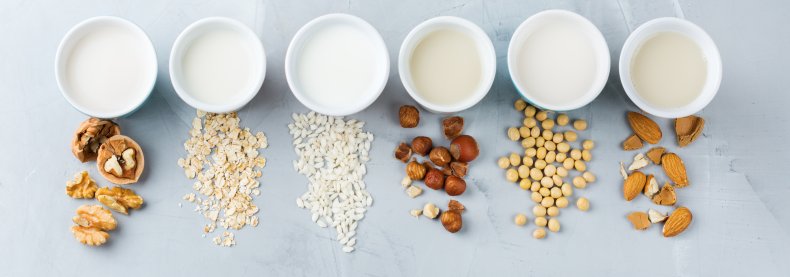It's hard to believe that plant-based milk substitutes can deliver the same nutritional benefits as cow's milk. And, in most cases, they can't.
Milk alternatives can be found in 12 percent of U.S. households, according to data from the New Zealand Embassy in Washington, and one-third of Americans report drinking non-dairy milk at least once a week.
For some people, milk alternatives are a dietary requirement. Others choose to make the switch due to environmental or ethical concerns. However, due to their similarities in taste and texture, it can be easy to forget that milk alternatives are not a direct nutritional replacement for cow's milk.

"Cow's milk can be a source of calcium, vitamin D, and protein for people who consume dairy," Abigail Johnson, a professor in nutrition and human health at the University of Minnesota, told Newsweek. "Calcium and vitamin D are two nutrients most people in the United States need more of in their diet. Cow's milk is naturally high in calcium and is fortified to provide a good source of vitamin D. While most people consume enough protein as part of their usual diet, milk is also a good source of high digestible protein."
To determine whether plant-based milks were able to provide the same nutritional benefits, Johnson and her team examined the nutritional content of more than 200 plant-based milk alternatives sold in the U.S.
Overall, 72 percent of the plant-based milks were fortified with both calcium and vitamin D at levels comparable to those found in cow's milk. However, for the majority of plant-based milks, the protein content was significantly lower than what you would find in cow's milk.
Per cup, cow's milk contains about 8 grams of protein, about one-sixth of the recommended daily protein intake for an average adult. However, according to Johnson's research, the median protein content for plant-based milks was only 2 grams per cup, with only 16 percent of plant-based milks containing protein levels similar or grater than cow's milk. Soy- and pea-based milks were more likely to have higher levels of protein.
Overall, only 12 percent of plant-based milks contain comparable or greater amounts of all three nutrients.

"Our results provide evidence that many plant-based milk alternatives are not nutritionally equivalent to cow's milk," Johnson said. "Based on these findings, consumers should look for plant-based milk alternative products that list calcium and vitamin D as ingredients. They may also want to consider adding other sources of calcium and vitamin D to their diets [...] like egg yolks or fatty fish."
So which plant milks are the closest to cow's milk in terms of their nutritional profile? "Across many nutrients, taken together, fortified soy milk products from the sample that we collected were the most similar to cow's milk," Johnson said.
Ultimately, plant-based milks can provide a healthy, sustainable alternative to cow's milk, but in most cases, they are not a complete substitute. It is always important to check the label and make adjustments elsewhere in your diet to ensure you are meeting your daily nutritional needs.
"Our findings point to a need to ensure that consumers are aware that many plant-based milk alternative products in the marketplace today are not nutritionally equivalent to cow's milk," Johnson said. "Product labeling requirements and dietary guidance to the public are among the approaches that may be helpful in alerting and educating consumers."
Johnson will present her research at the American Society of Nutrition's flagship meeting, NUTRITION 2023, on July 24.








